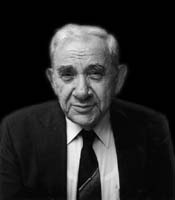 artists, public figures and to one organization. Among the recipients of the prize was Professor Shmuel Safrai, a senior member of the Jerusalem School of Synoptic Research. The nationally televised awards ceremony was held in Jerusalem. On the stage of the Jerusalem Theater were recipients and dignitaries, including President Moshe Katsav, Prime Minister Ariel Sharon, Education Minister Limor Livnat, Supreme Court President Aharon Barak and Jerusalem Mayor Ehud Olmert. After receiving a plaque from Minister Livnat, Professor Safrai was congratulated by President Katsav, Prime Minister Sharon, and the other dignitaries.
artists, public figures and to one organization. Among the recipients of the prize was Professor Shmuel Safrai, a senior member of the Jerusalem School of Synoptic Research. The nationally televised awards ceremony was held in Jerusalem. On the stage of the Jerusalem Theater were recipients and dignitaries, including President Moshe Katsav, Prime Minister Ariel Sharon, Education Minister Limor Livnat, Supreme Court President Aharon Barak and Jerusalem Mayor Ehud Olmert. After receiving a plaque from Minister Livnat, Professor Safrai was congratulated by President Katsav, Prime Minister Sharon, and the other dignitaries.
Among the reasons given by the awards committee for awarding Israel’s highest honor to Professor Safrai:
His great expertise in the Mishnah and Talmud, in Greek and Latin sources, and in the formation of nascent Christianity, gives his research a historical breath and intellectual depth…The books and articles Professor Safrai has produced over the last fifty years have received international attention and they have been translated into many languages.
The committee commented:
Professor Safrai’s life is characteristic of the lives of the founders of the State of Israel: before becoming a professor at the Hebrew University, he was a construction worker, was ordained as a rabbi [at age 20!], was a member of Kibbutz Sedeh-Eliyahu [in the Beth-Shean Valley], was a school teacher, was active in the Haganah [the pre-State army] and served in the Israel Defense Forces….
See Professor Safrai biography.
Later Wednesday evening several members of the Jerusalem School were privileged to be among the 100 guests at a reception honoring Professor Safrai that was held at the Shalom Hartman Institute in Jerusalem. The reception was hosted by Safrai’s son, Professor Ze’ev Safrai, and daughter, Professor Chana Safrai (also a member of the Jerusalem School).
I would like to congratulate Professor Safrai on his award, and add a personal note:
I have known Professor Safrai since 1965 when he was one of my instructors at the Hebrew University. Since the 1970s we have been involved in the collaborative research of the Jerusalem School. In the 1980s and 1990s I edited dozens of pieces that he wrote for Jerusalem Perspective magazine. I have spent literally hundreds of hours with him.
In addition to the hours we have spent together pouring over drafts of his articles, I have taken up many hours of his valuable time asking him questions about the life and words of Jesus and their Jewish background. (For instance: “Could the Friday Jesus was crucified have been the first day of Passover, a day when work is forbidden, if, as Luke 20:13 states, the women prepared spices and ointments?”) Many of my questions were due to my superficial knowledge of the subject matter, but often they arose because I had failed to read carefully Professor Safrai’s published research. However, never once in all the years of our acquaintance did Professor Safrai say, “That’s a stupid question” or, “I don’t have time for you now. Go read this or that article.” Never once did he show irritation or impatience!
Not only is Professor Safrai one of the greatest scholars that the Hebrew University has ever produced, he is also a mensch. Kind, well-mannered, and above all, patient, he has been a model of right living to his many students.
Professor Safrai’s behavior exceeds his scholarship, something that can be said of few scholars. He deserves a second prize, this one for humility and kindness. If I have ever known a person who epitomizes the Beatitudes, it is Professor Shmuel Safrai. Truly, “his face shines like fine gold” (Avot de-Rabbi Natan, Version A, chap. 24), and there is “no one above him” (Sifre Deuteronomy, Ekev 48). Since his good deeds exceed his wisdom, he is like “a tree whose branches are few, but whose roots are many, so that even if all the winds in the world come and blow upon it, it cannot be stirred from its place” (Mishnah, Avot 3:18).


